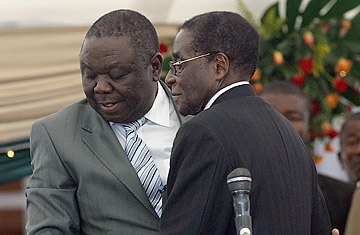
Zimbabwe's opposition leader Morgan Tsvangirai, left, head of the Movement for Democratic Change, is greeted by President Robert Mugabe after being sworn in at the State House in Harare on Feb. 11
Former Zimbabwean opposition leader Morgan Tsvangirai was sworn in as Prime Minister by President Robert Mugabe Wednesday and urged his countrymen to unite in an effort to revive the country. "For too long, Zimbabwe has endured violent political polarization," he told a rally of thousands in the Zimbabwean capital of Harare. "This must end today. We can no longer afford the violence of brother on brother. Let's put our differences aside. Everyone is hungry. We have to heal our nation by forgiving our brother." Tsvangirai acknowledged that working with Mugabe would be difficult; he could forgive but not forget, he said, "because tomorrow it might happen again." But he insisted that the deal to share power with Mugabe, while "not a perfect agreement," is "still a workable one."
For his part, Mugabe, who has ruled Zimbabwe for 28 years since its independence, hailed a "victory for Zimbabwe" and offered "my hand of friendship and cooperation, warm cooperation and solidarity" to Tsvangirai. "If yesterday we were adversaries," he said at Tsvangirai's swearing-in, "today we stand in unity." Mugabe too acknowledged the "deep-seated mistrust" between the two sides. "We are all aware that the road has been long, tedious and often frustrating." But he added that the pair had "shown that we have the capacity to resolve our differences. We must build on this unity by turning our swords into plowshares."
The two leaders' words were welcomed by the crowds who gathered to watch in the city center. Addelaide Choga had traveled from Chipinge, around 300 miles east of Harare, to see the ceremony. "This is what we've been waiting for," she said. "With Tsvangirai in government ... [this] is where the future of the country lies." Freeman Matake of Masvingo added, "This is the dawn of a new era in Zimbabwe." A police officer, who spoke only on condition of anonymity, agreed. "This man seems to be the answer to our problems. His determination is a source of hope." (See pictures from the tense walk-up to Zimbabwe's elections.)
The animosity between Mugabe's regime and Tsvangirai's Movement for Democratic Change (MDC) is unlikely to be cured by a few fine words. Mugabe's security forces have spent the past nine years beating and killing members of the MDC. After a general election on March 29, 2008, which the ruling Zanu-PF lost and in which Mugabe came in second to Tsvangirai in the presidential vote, security forces and their allies killed nearly 200 activists and injured thousands more in a campaign of terrorism across the country. Tsvangirai himself has been beaten more than once. Even after Mugabe and Tsvangirai agreed in principle to form a unity government last September, they haggled over the details for close to six months. As Tsvangirai himself reminded the crowd, hundreds of MDC supporters remain in detention. "It hurts that as we celebrate here today, there are some who are in prison," he said. Those supporters would be freed, he said, adding that the "culture of impunity" and the "looting of state resources because you are a big shot" were over.
Even if they can work together, Tsvangirai and Mugabe must revive an economy — and a country — in a coma. Unemployment is near universal. The currency is worthless and all but abandoned. More than half the country needs food aid. Cholera has killed more than 3,000 and infected tens of thousands more. Millions of Zimbabweans have simply fled the country.
— With reporting by Simba Rushwaya / Harare
